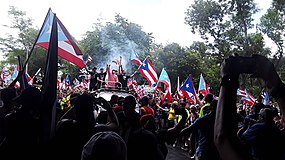| Telegramgate | |||
|---|---|---|---|
 Protesters celebrating the resignation of Ricardo Rosselló in San Juan, the day after the announcement. Residente, Bad Bunny and Ricky Martin (center, L–R) were among many public figures that demanded Rosselló's resignation. | |||
| Date | July 8, 2019 – August 12, 2019 (1 month, 1 week and 4 days) | ||
| Location | Main demonstrations in Puerto Rico:
Solidarity protests:
| ||
| Caused by | Leak of hundreds of pages of vulgar, racist, and homophobic comments in a private group chat between Governor Ricardo Rosselló and members of his cabinet | ||
| Goals | Resignation of Rosselló as the Governor of Puerto Rico | ||
| Methods | Internet activism, graffiti, sit-ins, street protests, picketing, protest art | ||
| Resulted in | Resignation of Rosselló as the Governor of Puerto Rico effective August 2 at 5:00 p.m. AST | ||
| Concessions |
| ||
| Parties | |||
| |||
| Lead figures | |||
Protesters Government
| |||
| Casualties | |||
| Death(s) | 0 | ||
| Injuries | At least 20[3] | ||
| Arrested | At least 16[3] | ||
Telegramgate, also known as Chatgate or RickyLeaks,[4][5] was a political scandal involving Ricardo Rosselló, then Governor of Puerto Rico, which began on July 8, 2019, with the leak of hundreds of pages of a group chat on the messaging application Telegram between Rosselló and members of his cabinet. The messages were considered vulgar, misogynistic, racist, and homophobic toward several individuals and groups, and discussed how they would use the media to target potential political opponents. The leak came in the midst of allegations by former Secretary of Treasury of Puerto Rico, Raúl Maldonado Gautier, that his department boasted an "institutional mafia" that Rosselló was involved in. The leaks also came a year after a previous scandal, dubbed WhatsApp Gate, involving other members of Rosselló's cabinet.[6]
Mass protests arose, reaching up to a million people at a single event on July 17.[7] On July 22, up to a million protesters[8] shut down the Expreso Las Américas, an 11-lane highway.[9][10][11] While several of his staff resigned in the wake of the leaks,[11] Rosselló initially refused to resign as governor and simply resigned as president of the governing pro-statehood New Progressive Party on July 21 and said he would not seek re-election in the 2020 Puerto Rican general election. By July 22, there had been eleven consecutive days of protests, near La Fortaleza, the Governor's residence in San Juan.[12] On July 24, Rosselló announced that he would resign as governor on August 2.[9][11] On August 2, Pedro Pierluisi, former Resident Commissioner of Puerto Rico was sworn in immediately after Rosselló left office, but was later ordered by the Supreme Court of Puerto Rico to abandon, since his swearing-in was not constitutional. Ultimately, the Secretary of Justice of Puerto Rico, Wanda Vázquez Garced, who was initially reluctant to take office, was sworn in as Governor of Puerto Rico. She became the second woman to assume the office and the first person to take over the position by succession and not by a democratic election.
- ^ Mazzei, Patricia; Robles, Frances (July 24, 2019). "Ricardo Rosselló, Puerto Rico's Governor, Resigns After Protests". The New York Times. Archived from the original on July 25, 2019. Retrieved July 27, 2019.
- ^ Mazzei, Patricia; Robles, Frances (July 25, 2019). "Puerto Rico Governor Misread Anger Brewing Against Him". The New York Times. Archived from the original on September 4, 2024. Retrieved July 27, 2019.
- ^ a b "Varias organizaciones analizan el impacto de las manifestaciones contra Rosselló". El Nuevo Día. July 29, 2019. Archived from the original on September 4, 2024. Retrieved July 29, 2019.
- ^ Weissenstein, Michael; Colon, Joel (July 16, 2019). "'Chatgate' Scandal Plunges Puerto Rico Governor into Political Crisis". Time. Archived from the original on July 16, 2019. Retrieved July 23, 2019.
- ^ "Puerto Ricans demand resignation of governor in massive protests". Salon. July 22, 2019. Archived from the original on July 27, 2019. Retrieved July 24, 2019.
- ^ Serrano, Oscar J. (July 13, 2019). "WhatsApp Gate 2.0: Nuevo chat expone a la Administración Rosselló". NotiCel (in Spanish). Archived from the original on July 27, 2019. Retrieved July 19, 2019.
- ^ Morales, Ed (July 19, 2019). "Why Half a Million Puerto Ricans Are Protesting in the Streets". The Nation. Archived from the original on July 31, 2019. Retrieved July 31, 2019.
- ^ "Un millón de personas habría asistido al Paro Nacional". July 23, 2019. Archived from the original on July 28, 2019. Retrieved July 28, 2019.
- ^ a b Allyn, Bobby; Neuman, Scott (July 25, 2019). "Puerto Rico Gov. Ricardo Rosselló Resigns In Wake Of Text Message Scandal". National Public Radio. Archived from the original on July 25, 2019. Retrieved July 25, 2019.
- ^ "Puerto Ricans shut down major highway, march toward capitol to demand that the governor resign". The Washington Post. July 22, 2019. Archived from the original on July 27, 2019. Retrieved July 27, 2019.
- ^ a b c Romero, Simon; Robles, Frances; Mazzei, Patricia; Del Real, Jose A. (July 27, 2019). "15 Days of Fury: How Puerto Rico's Government Collapsed". The New York Times. Archived from the original on July 27, 2019. Retrieved July 27, 2019.
- ^ Cite error: The named reference
DNCarlaMinetwas invoked but never defined (see the help page).